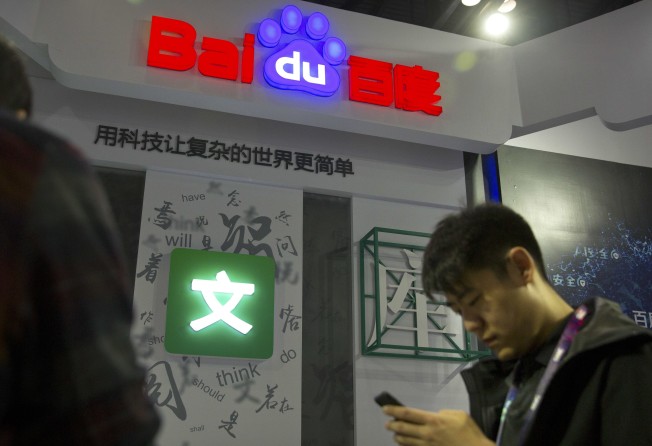Baidu bucks the capital winter to play catch-up to Alibaba, Tencent in outside investments
- Nasdaq-listed company made a total of 92 investments in 2018, compared to 41 the previous year

Baidu, operator of China’s largest search engine and a major player in artificial intelligence (AI), more than doubled its number of outside investments last year, bucking a trend that saw a winter chill descend on the venture capital market in the fourth quarter.
The Nasdaq-listed company made a total of 92 investments in 2018, compared to 41 the previous year, according to a company source familiar with the matter. Baidu did not immediately respond to an emailed inquiry for comment.
Baidu’s growth rate in deals was also the fastest among the so-called BAT tech trio of Baidu, Alibaba Group Holding and Tencent Holdings, according to separate statistics from Beijing-based data firm ITjuzi. With 13 unique AI investments in 2018, Baidu Ventures was also listed as the most active corporate venture capital investor in the space, according to a separate report by CB Insights.
“While Tencent and Alibaba are established in other sectors as corporate venture capital firms, Baidu’s chance might only lie in AI investment,” said Wang Hui, a Beijing-based private equity investor.
Investing in AI start-ups is also in line with Baidu’s own business strategy, Wang added.
Rhetoric about a “capital winter” has grown since the fourth quarter of last year amid comments by some of China’s most high-profile venture capitalists on the difficulty of raising new funding. As growth in the economy slows, start-ups are coping with lay-offs and employees are under pressure to put in longer working hours.
The latest report from research firm Zero2IPO shows that Chinese venture capital investment in January totalled 29.4 billion yuan (US$34.1 billion), representing a 67.5 per cent year-on-year slide. The number of deals slumped by 63.5 per cent over the same period.
The “easy money” is now over, according to Joseph Tsai, Alibaba’s executive vice-chairman. “Entrepreneurs [in China] had it too easy raising gigantic billion-dollar rounds of capital and multibillions in valuation,” he said at the Thomson Reuters Breakingviews Predictions 2019 event earlier this month. “[A correction] will happen and it’s healthy.”
New York-listed Alibaba is the parent company of the South China Morning Post.
Baidu had a “slow start” compared to Alibaba and Tencent, but has since stepped up the pace of investments for its own ecosystem, according to ITjuzi. Most of its 2018 investments focused on hardware and health care.
In comparison, Tencent and Alibaba made 163 and 129 investment deals, respectively, in 2018, each focusing on their respective areas of entertainment and corporate services.
In some cases, BAT were common investors in companies. Last year, Baidu and Tencent separately put money into state media-backed Pear Video and US-based AI health care start-up Atomwise.